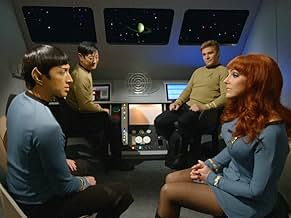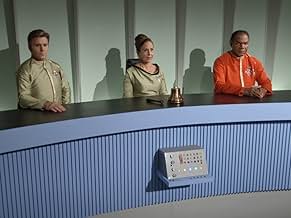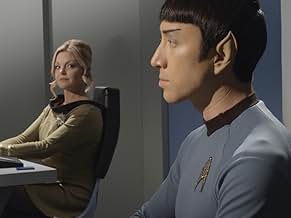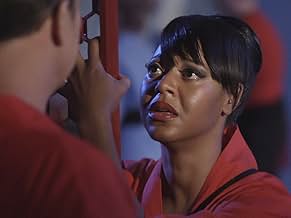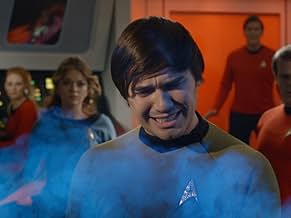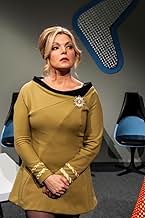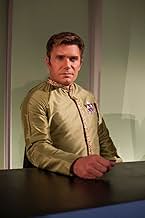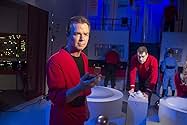Embracing the Winds
- Episode aired Sep 3, 2016
- 44m
IMDb RATING
7.2/10
334
YOUR RATING
Kirk has to choose between Spock and a competing female officer for captaincy of another starship, but issues of competence in the role as well as gender issues cause difficulties.Kirk has to choose between Spock and a competing female officer for captaincy of another starship, but issues of competence in the role as well as gender issues cause difficulties.Kirk has to choose between Spock and a competing female officer for captaincy of another starship, but issues of competence in the role as well as gender issues cause difficulties.
- Awards
- 2 wins & 3 nominations total
Christopher Doohan
- Mr. Scott
- (as Chris Doohan)
Marina Sirtis
- Computer
- (voice)
Featured reviews
While some might think that this installment of "Star Trek Continues" is a bit preachy and indicative of our times, it must be remembered that the original show did NOT shy away from cultural issues such as racism. So, the fact that this is a strongly feminist episode seems appropriate considering the pedigree.
When the show begins, Kirk and Spock are meeting with Commodore Gray (Erin Gray of "Buck Rogers" fame). It seems that there was an accident with the life support system on the Hood*....and the entire crew is dead. Because of that they need a new crew and commander...and she wants Spock for that job. However, a woman who also seems very qualified objects and demands a hearing--saying that although women are in Star Fleet, command of a Constitution-class ship has always eluded them. Kirk, surprisingly, seems very sympathetic...even a feminist. Not QUITE the same Kirk of the original series fame, huh?
While this episode DID still feel a bit preachy, it was enjoyable and had a good point to make. While you see female commanders often in series such as "Star Trek the Next Generation" and "Star Trek Voyager", in the original series universe, you did rarely see women in charge.
The ending was interesting, as many ways it reminded me of the Kobayashi Maru scenario in which Kirk somehow avoids making a forced choice...and in this case, a miracle happened to save him once again from having to make the choice between Spock and the lady Commander. Worth seeing.
*If you care, the HMS Hood was a very famous British cruiser sunk by the German battleship Bismarck during WWII...and nearly every crew member perished in the incident. Of the more than 1300 crew members, only three managed to escape.
When the show begins, Kirk and Spock are meeting with Commodore Gray (Erin Gray of "Buck Rogers" fame). It seems that there was an accident with the life support system on the Hood*....and the entire crew is dead. Because of that they need a new crew and commander...and she wants Spock for that job. However, a woman who also seems very qualified objects and demands a hearing--saying that although women are in Star Fleet, command of a Constitution-class ship has always eluded them. Kirk, surprisingly, seems very sympathetic...even a feminist. Not QUITE the same Kirk of the original series fame, huh?
While this episode DID still feel a bit preachy, it was enjoyable and had a good point to make. While you see female commanders often in series such as "Star Trek the Next Generation" and "Star Trek Voyager", in the original series universe, you did rarely see women in charge.
The ending was interesting, as many ways it reminded me of the Kobayashi Maru scenario in which Kirk somehow avoids making a forced choice...and in this case, a miracle happened to save him once again from having to make the choice between Spock and the lady Commander. Worth seeing.
*If you care, the HMS Hood was a very famous British cruiser sunk by the German battleship Bismarck during WWII...and nearly every crew member perished in the incident. Of the more than 1300 crew members, only three managed to escape.
The issues brought up in this episode are ones that seem to be focused on in today's world not during the late 60s with Gene Roddenberry so this episode seemed out of place. I can also tell you that in the late 60s nobody would have ever referred to a woman officer as "Sir" as they did in this episode. I thought the episodes of the show was supposed to reflect what it would have been like if there had been a four season of the original show. I wish they would keep things in that context.
Kirk's superior is a woman so it is not difficult to imagine other ships had women for Captains which i did. This episode tries too hard to make a point that the show never showed a woman being a Captain in TOS. Personally it doesn't make sense to me for the reason I mentioned and flagging it made this episode very poor. The performances are fine. The production values continue to mimic that of TOS but the story is not up to the standard they already established. They did a better job exploring social issues with What Ships Are For and Lolani because tue issues were centered around aliens. The point was the human race resolved its conflicts with itself. A hopeful vision for the future of earth. That's Star Trek.
Generally regarded as the least pleasing episode of the series as it deals with modern gender issues that never took place in the 1960s.
Younger viewers might find this hour rather pleasing but the older crowd (like me) will find it a struggle.
In fact, I would just skip this episode all together as it is the sort of thing that lingers in your memory and watching it might damage your memories of STC. There is a nice, very brief, subplot with Chekov (too bad he was not more featured in the series) but other than that - "Embracing 2016" is a stinker.
Note: I have watched all eleven episodes of this series. It seems the makers of the show learned from their mistakes and never went down this sort of road again - in fact the last three episodes are great!
Younger viewers might find this hour rather pleasing but the older crowd (like me) will find it a struggle.
In fact, I would just skip this episode all together as it is the sort of thing that lingers in your memory and watching it might damage your memories of STC. There is a nice, very brief, subplot with Chekov (too bad he was not more featured in the series) but other than that - "Embracing 2016" is a stinker.
Note: I have watched all eleven episodes of this series. It seems the makers of the show learned from their mistakes and never went down this sort of road again - in fact the last three episodes are great!
ST:C is great, but this episode betrays Gene's legacy and feels out of place.
First, humanity in the 23rd century is supposed to be more evolved than the present day, and that's kind of the point of Star Trek. The federation isn't a foil for modern society, it's an example of what it might someday achieve. Simply transplanting modern issues into that future society feels forced and inauthentic, and whenever Star Trek has flirted with this, it's comes out worse for it. The appropriate foil for modern society, and the one that works and is used all of the time in Star Trek, is found in alien cultures and planets.
The second big fail is the moral lesson itself, because there's an easy answer that is readily ignored: Simply, *the ends don't justify the means*, and it's impossible that Spock wouldn't point this out forthwith. When (at least pre-Kurtzman) Star Trek reverses this dictum it's only thanks to astronomical stakes, and coincides with major self reflection (see: In the Pale Moonlight), as opposed to something petty like a promotion. Gene Roddenberry understood this back in the day, but lately there's an unfortunately illiberal strain of progressive ideology that rejects the notion, as is seen here.
First, humanity in the 23rd century is supposed to be more evolved than the present day, and that's kind of the point of Star Trek. The federation isn't a foil for modern society, it's an example of what it might someday achieve. Simply transplanting modern issues into that future society feels forced and inauthentic, and whenever Star Trek has flirted with this, it's comes out worse for it. The appropriate foil for modern society, and the one that works and is used all of the time in Star Trek, is found in alien cultures and planets.
The second big fail is the moral lesson itself, because there's an easy answer that is readily ignored: Simply, *the ends don't justify the means*, and it's impossible that Spock wouldn't point this out forthwith. When (at least pre-Kurtzman) Star Trek reverses this dictum it's only thanks to astronomical stakes, and coincides with major self reflection (see: In the Pale Moonlight), as opposed to something petty like a promotion. Gene Roddenberry understood this back in the day, but lately there's an unfortunately illiberal strain of progressive ideology that rejects the notion, as is seen here.
Did you know
- TriviaCommander Garrett Is either the grandmother or great-grandmother of Capt. Rachel Garrett who Is the captain of the USS Enterprise NCC 1701-C In the Star Trek TNG episode Yesterday's Enterprise.
- ConnectionsReferences Star Trek: Court Martial (1967)
Details
- Runtime44 minutes
Contribute to this page
Suggest an edit or add missing content

